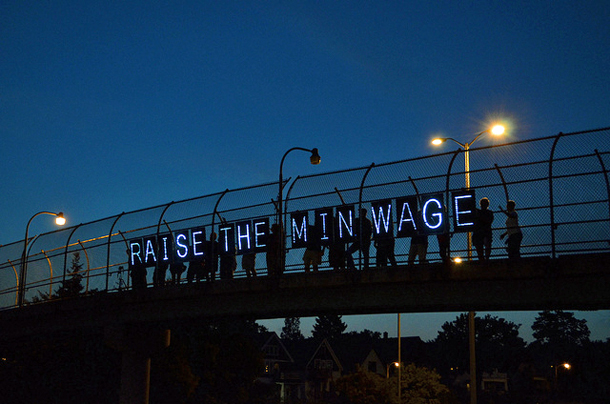The British Columbia government will raise the provincial minimum wage by 20 cents an hour starting in September and will tie future increases to the rising cost of living.
But critics said the initial increase is far too small, and even future increases will keep low-paid workers living in poverty.
"We will be indexing the minimum wage to the CPI, the British Columbia Consumer Price Index," Shirley Bond, the minister of jobs, tourism and skills training, told reporters at the legislature Thursday. "Moving forward, increases to the minimum wage will be predictable."
The minimum wage has been $10.25 an hour in B.C. since 2011, with restaurant servers getting $9 an hour because many also receive tips.
Bond said the minimum wage will move to $10.45 in September, which is what it would have been if the province had tied it to the cost of living in 2011. The server wage moves to $9.20 an hour.
After that, the minimum wage will increase each September to match any inflation in the CPI from the year before. If inflation is negative, however, the minimum wage will not decrease.
Other provinces already have predictable ways of raising their minimum wages, Bond said. "British Columbia really stood alone in the ad hoc approach it took to determining the minimum wage."
The B.C. Federation of Labour has been campaigning to raise the minimum wage to $15 an hour. Asked about the increase announced today, Fed President Irene Lanzinger said, "I think it's pathetic. It's not even close to what we need."
Tying the wage to the cost of living but starting from such a low level is a problem, she said. "This 20-cent increase, and then indexing, just entrenches poverty level wages."
If the CPI goes up by two per cent a year, it will take until 2034 to reach $15 an hour, said Lanzinger.
BC below Seattle
Various cities in the United States are moving to $15 an hour. Some, like Seattle-Tacoma are already there, and B.C. could afford to as well, she said. "We can do this, and we should do it because it's the right thing to do."
Lanzinger compared the B.C. announcement today to the government's budget in February that gave a tax break to the top two per cent of earners.
"They're okay with people working full time and living in poverty and [at the same time] giving the richest two per cent of British Columbians $227 million," she said referring to the cost of the tax break.
NDP labour critic Shane Simpson welcomed tying the minimum wage to the cost of living, but said the rate needs to be higher.
"It's about time they put indexing in place. They're late to the party on that," Simpson said. Otherwise, as time goes on, what people can buy with their earnings decreases, he said. "From the day you put it in place, it begins to erode... People have fallen behind."
Small impact
Somebody who earns an extra 20 cents an hour will see little increase in pay for a full eight-hour workday. "It wouldn't buy you a cup of coffee," Simpson said.
He stopped short of endorsing moving the minimum wage to $15 an hour, however. "We understand why the BCFED is calling for $15," he said. "You don't make those big jumps overnight."
Premier Christy Clark recently dismissed the idea of moving the minimum wage to $15 an hour, and Bond repeated that position today. "I've been very clear that our government is not moving to $15 an hour," Bond said. Such an increase would have a big effect on small businesses and on the workforce, she said.
Bond defended the province's plan, noting that half of the people who receive the minimum wage live with their parents and that wages for most workers are higher. B.C. has the fourth highest average wage in the country for adult workers, she said.
"We believe this is a reasonable approach to the minimum wage," she said. "What matters to me is we're seeing more people have well-paying, family-supporting jobs."
Lanzinger said that only 23 per cent of minimum wage earners are students living at home, that 10,000 are people over 55, and that sometimes even young people are earning money that's key to their families. "We have all kinds of family situations here," she said.
And while other supports are welcome, "Those things don't buy your groceries. They don't pay your rent." People who work full time should earn enough to move above the poverty line, she said. "There's no substitute for paying a decent wage." ![]()
Read more: Labour + Industry, BC Politics

















Tyee Commenting Guidelines
Comments that violate guidelines risk being deleted, and violations may result in a temporary or permanent user ban. Maintain the spirit of good conversation to stay in the discussion.
*Please note The Tyee is not a forum for spreading misinformation about COVID-19, denying its existence or minimizing its risk to public health.
Do:
Do not: